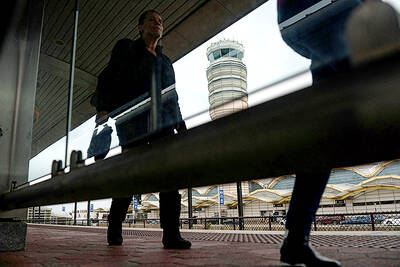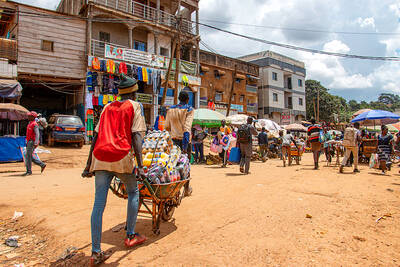Thousands of Chinese immigrants are pouring into Peru every year, lured by mafia promises of quick passage to the US.
But the American dreams of these young economic migrants often end in extortion, violence or abandonment on the side of the road or on a deserted beach.
This was the fate of 74 Chinese migrants sent back to Peru by Costa Rican authorities in October after being rescued from a boat that had been drifting for weeks and was about to sink into the Pacific Ocean.
Another 54 were found abandoned without food or documents in a cove near Talara in northern Peru last month after they were promised passage to the US through Central America.
According to the country's office of immigration, DIGEMIN, some 8,778 Chinese nationals entered the country legally last year, of which only 733 were then legally allowed to leave for the US.
"Most Chinese are legally entering the country on a [tourist] visa, and they mainly come from southern China," DIGEMIN director Diomedes Diaz said. "These people come here tricked by organizations with international links into thinking that paradise awaits them in the United States."
For these high-risk journeys, "the family or the mafia loans them the money," said Isabelle Lausent-Herrera, a researcher who specializes in Asian migration in Peru at the National Center for Scientific Research.
The migrants risk more than deportation. They often offer up family members who have remained behind in China as collateral, sell all their belongings or promise to work for years to repay their debts.
"They borrow from [Chinese] banks which specialize in this type of trafficking and have links to the mafia who ensure that those who don't repay in time are punished," Lausent-Herrera said.
In recent years, 43 percent of illegal Chinese migrants have come from Fujian Province, while a large portion also come from Guangdong Province.
"Ultimately, the Chinese are following the same path as was taken in the 19th century to enter the United States where they pass through Peru," Lausent-Herrera said.
Those wealthy enough to pay up to US$70,000 for transport, false documents and lodgings can secure a comfortable air passage from Peru to the US.
Typical migrants, however, usually pay US$15,000 to US$20,000 to find temporary work in Peruvian grocery stores, Chinese restaurants or casinos and risk violence, extortion, starvation and sickness on more dangerous land or sea routes.
While in Peru they blend easily into a Chinese community founded in the 19th century to harvest guano and which is now several hundred thousand people strong.
But Peruvian police say they are now overwhelmed with at least a dozen gangs shuttling illegal immigrants through their borders.

FRUSTRATIONS: One in seven youths in China and Indonesia are unemployed, and many in the region are stuck in low-productivity jobs, the World Bank said Young people across Asia are struggling to find good jobs, with many stuck in low-productivity work that the World Bank said could strain social stability as frustrations fuel a global wave of youth-led protests. The bank highlighted a persistent gap between younger and more experienced workers across several Asian economies in a regional economic update released yesterday, noting that one in seven young people in China and Indonesia are unemployed. The share of people now vulnerable to falling into poverty is now larger than the middle class in most countries, it said. “The employment rate is generally high, but the young struggle to

ENERGY SHIFT: A report by Ember suggests it is possible for the world to wean off polluting sources of power, such as coal and gas, even as demand for electricity surges Worldwide solar and wind power generation has outpaced electricity demand this year, and for the first time on record, renewable energies combined generated more power than coal, a new analysis said. Global solar generation grew by a record 31 percent in the first half of the year, while wind generation grew 7.7 percent, according to the report by the energy think tank Ember, which was released after midnight yesterday. Solar and wind generation combined grew by more than 400 terawatt hours, which was more than the increase in overall global demand during the same period, it said. The findings suggest it is

IN THE AIR: With no compromise on the budget in sight, more air traffic controllers are calling in sick, which has led to an estimated 13,000 flight delays, the FAA said Concerns over flight delays and missed paychecks due to the US government shutdown escalated on Wednesday, as senators rejected yet another bid to end the standoff. Democrats voted for a sixth time to block a Republican stopgap funding measure to reopen government departments, keeping much of the federal workforce home or working without pay. With the shutdown in its eighth day, lines at airports were expected to grow amid increased absenteeism among security and safety staff at some of the country’s busiest hubs. Air traffic controllers — seen as “essential” public servants — are kept at work during government shutdowns, but higher numbers

Elvis Nghobo tried to get into four different professional schools in Cameroon, but could not make it. Frustrated, the 34-year-old turned to selling food at a market in Yaounde, the country’s seat of power. Nghobo blames his woes on what he calls a corrupt education system that favors children of the elite. As the central African country prepares for Sunday’s presidential election, he said he would not be heading out to vote. He called the results a foregone conclusion for 92-year-old Paul Biya, the world’s oldest president, who has ruled for Nghobo’s entire life. “He is already too old to govern, and it’s boring